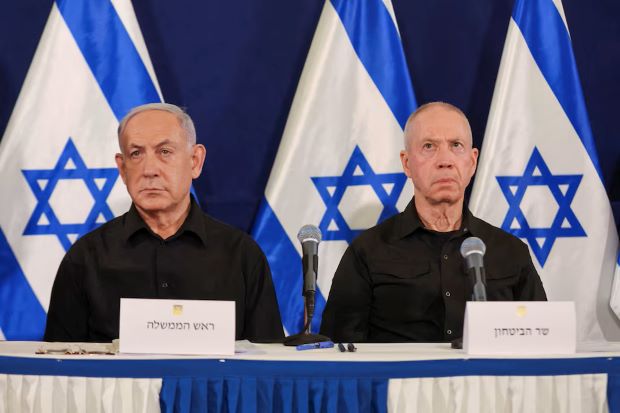ICC prosecutor requests warrants for Netanyahu and Hamas leaders

By Matthew Mpoke Bigg and Patrick Kingsley
THE HAGUE – International Criminal Court (ICC) prosecutor Karim Khan said Monday (20) that he had requested arrest warrants for the leaders of Hamas and for Prime Minister Benjamin Netanyahu of Israel for war crimes and crimes against humanity in relation to the Oct. 7 attack and the war in the Gaza Strip.
In a statement, Khan said he was applying for arrest warrants for Yehia Sinwar, Mohammed Deif and Ismail Haniyeh of Hamas. He also said he was requesting warrants for Netanyahu and Israel’s defence minister, Yoav Gallant.
While Khan’s request must still be approved by judges from the court, the announcement is a blow to the government of Netanyahu and will likely fuel international criticism of Israel’s strategy in its seven-month campaign against Hamas and the war’s toll on Gaza’s civilian population.
There was no immediate response from the Israeli government or from Hamas. Israel is not a member of the court and does not recognize its jurisdiction in Israel or Gaza. But if warrants are issued, those named could be arrested if they travel to one of the court’s 124 member nations, which include most European countries but not the United States.
Khan’s statement said he had “reasonable grounds to believe” that Sinwar, Deif and Haniyeh were responsible for “war crimes and crimes against humanity” — including “the killing of hundreds of Israeli civilians in attacks perpetrated by Hamas.”
“It is the view of my office that these individuals planned and instigated the commission of crimes on 7 October 2023, and have through their own actions, including personal visits to hostages shortly after their kidnapping, acknowledged their responsibility for those crimes,” the statement said.
With regard to Netanyahu and Gallant, the prosecutor said he believed the Israeli leaders bore criminal responsibility for war crimes and crimes against humanity, including using starvation as a weapon of war and “intentionally directing attacks against a civilian population.”
The court’s announcement does not come entirely as a surprise. In March, Volker Türk, the United Nations’ human rights chief, said Israel’s restrictions on aid entering Gaza and the way it was conducting the war might amount to the use of starvation as a weapon. That is a war crime under the Rome Statute, the treaty of the International Criminal Court.
Even though the court is a judicial body independent from the United Nations, Türk’s statement drew attention given his seniority. Israeli officials first said in late April that they believed the court was preparing to issue arrest warrants for senior government officials on charges related to the war.
On April 26, Netanyahu said on social media that the country “will never accept any attempt by the ICC to undermine its inherent right of self-defence.” Any intervention by the ICC “would set a dangerous precedent that threatens the soldiers and officials of all democracies fighting savage terrorism and wanton aggression,” Netanyahu said.
The ICC is the world’s only permanent international court with the power to prosecute individuals accused of war crimes, genocide and crimes against humanity. It cannot try defendants in absentia, but its warrants can make international travel difficult. The court has no police force, relying instead on its members to make arrests. An arrested suspect is typically transferred to The Hague to appear before the court.
Israel has denied causing the hunger crisis in Gaza or placing limits on humanitarian aid entering the territory. It says the UN and other organizations have failed to adequately distribute food and other humanitarian goods there. But aid experts have said the crisis is a direct result of the war and Israel’s near-complete siege of the territory.
The food situation in Gaza was considered stable before the war began, but it has sharply deteriorated since then and the prospect of famine has been looming for months. Israeli officials impose rigorous checks on any aid going into Gaza, which is home to around 2.2 million people, and the chaotic conditions on the ground there make aid deliveries difficult.
-New York Times


Comments are closed, but trackbacks and pingbacks are open.